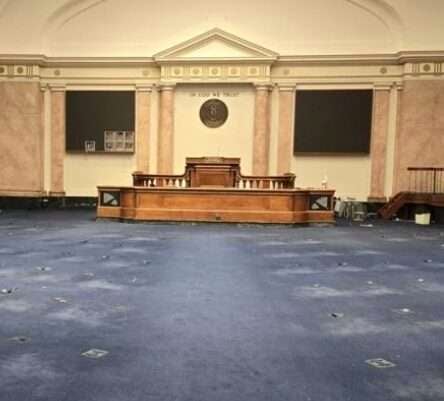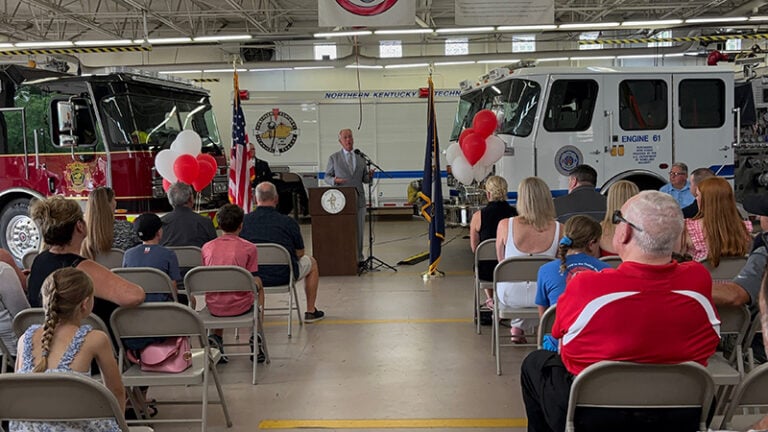By Trey Grayson
CivicPoint
Tuesday, Kentucky voters went to the polls for the May primary. Well, some of them did, but not very many.
Statewide, voter turnout was about 19%, according to the State Board of Elections, one of the lowest statewide turnouts in a county election year (what we call the federal mid-term election in Kentucky). In contrast, turnout in the past three primaries during county election years was: 24% in 2018, 27% in 2014, and 32% in 2010.
As politics has become more nationalized, county races are no longer driving as many voters to the polls as in the past. Thus, with no competitive races in either primary for US Senate, as incumbent Rand Paul and former State Representative Charles Booker both breezed their ways to their respective party nominations, turnout was likely to be low. In contrast, 2010, the high-water mark, saw competitive races in both parties’ US Senate primaries.

Generally good night for incumbents. Incumbent legislators generally prevailed. Among the most contested races, State Senator Donald Douglas (22nd District, Jessamine), and House Members Walker Thomas (8th District, Christian), Samara Heavrin (18th District, Grayson), Brandon Reed (24th District, LaRue), and Kim King (55th District, Mercer) all overcame spirited primary contests from libertarian-leaning challengers. First-term incumbent Bill Wesley (91st District, Estill) also overcame a tough primary challenge.
The incumbents campaigned on the accomplishments of the past session that typically appeal to Republican primary voters, including tax cuts and pro-life legislation. Independent groups stepped in to help amplify that message, which helped to overcome energetic opposition.
Not a good night for Tom Burch and Northern Kentucky. Statewide only four incumbent legislators – all in the House – lost their primaries. In Louisville, Tom Burch (D-30th), Kentucky’s longest serving House member, lost his rematch to Daniel Grossberg. Health issues forced the 90-year old Burch to miss several legislative days during the past year’s session and undoubtedly impacted his campaign.
In Northern Kentucky, three House members – all committee chairs – lost to challengers backed by 4th District Congressman Thomas Massie. Judiciary Chair Ed Massey (R-66th, Boone) had faced only token opposition in his two previous runs, but was soundly defeated by attorney Steven Rawlings, while Licensing & Occupation Chair Adam Koenig (R-69th, Kenton) and Transportation Budget Sub-Committee Chair Sal Santoro (R-60th, Boone) narrowly lost to attorney Steven Doan and speech pathologist Marianne Proctor, respectively.
All three challengers ran strong campaigns, were well funded, with many volunteers, and worked in a coordinated manner. In addition, they were backed by several independent groups that amplified their message across the districts.
While incumbent county officials and legislators prevailed throughout the rest of Northern Kentucky – including long-time Judge Executives Gary Moore (Boone) and Steve Pendery (Campbell) – the loss of three committee chairs, especially Santoro, whose committee takes the lead in writing the state’s biennial road plan, is a blow to Northern Kentucky’s clout.
Such defeats in Northern Kentucky are rare. The last legislator to lose a primary in the region was in the late 1980’s, and observers had trouble remembering any incumbent Republican legislator ever losing a primary.
While each race is unique, redistricting necessitated by growth in the region and low turnout – even by Northern Kentucky’s abysmally low standards – clearly hurt Santoro and Koenig.
Boone County, which contains all of the 60th and 66th districts and half of the 69th district, has been one of the fastest growing counties in the state for the past few decades and has become fertile ground for libertarian Republicans, such as Rawlings, Doan and Proctor, and also saw a long-time incumbent county commissioner also lost by a large margin.
In addition to the three libertarian Republicans who won in Northern Kentucky, four more won open seats: Candy Massaroni (replacing the retiring Chad McCoy in House District 50 in Nelson County), Rebecca Raymer (replacing the retiring Melinda Gibbons Prunty in House District 15 in Hopkins County), former Bevin administration official John Hodgson (replacing retiring Jerry Miller House in House District 36, in Jefferson County), and Lindsey Tichenor (replacing the retiring C. B. Embry in Senate District 6, which was moved to Oldham County during redistricting).
In the two GOP incumbent-on-incumbent House primaries necessitated by redistricting, Jim Gooch dispatched Lynn Bechler in Western Kentucky’s 12th district, while Bobby McCool soundly defeated Norma Kirk-McCormick in Eastern Kentucky’s 97th District.
Looking to November. Most observers believe that when the dust settles after November, Republicans will continue to possess large margins in both chambers, and may actually increase their numbers.
In fact, as one observer quipped, we have returned to the time when the real election in Kentucky was in May, rather than November, and was fought between “two parties,” making today a throwback to the way it used to be when the winner of the primary contest between the two Democratic Party factions would almost always prevail in the fall. For many years, that meant the Happy Chandler faction versus the Clements/Wetherby/Combs faction. Now it’s the libertarian Republicans versus the traditional, mainstream Republicans. (And in contrast, in Louisville and Lexington, it is progressive Democrats versus center-left Democrats.)
In the fall, House Republicans have their eyes on the seats held by incumbent Democrats Patti Minter (20th District, Warren), Jeffrey Donohue (District 37th, Jefferson), Buddy Wheatley (65th District, Kenton), Angie Hatton (94th District, Letcher), and Ashley Tackett Laferty (95th District, Floyd).
House Democrats have fewer targets with their focus on Ken Fleming (48th District, Jefferson), Jason Nemes (33rd District, Jefferson), as well as Steven Doan who defeated Koenig in the 69th District in Kenton County.
In the Senate, first-term state senator Robby Mills (4th District, Henderson) will be targeted by Democrats, while Karen Berg (26th District, Jefferson), who won a special election in 2020, will be targeted by Republicans.
Perhaps the most interesting race will take place in the newly reconfigured 20th State Senate District, which now includes all of Franklin, Gallatin and Owen counties, and a portion of Boone and Kenton Counties. Former legislator Gex Williams, who served in the 1990s before leaving for an unsuccessful bid for Congress in 1998, won a four-way Republican primary (with Congressman Massie’s endorsement) for the right to take on former Franklin County Judge-Executive Theresa Barton.
Expect lots of jockeying for leadership and committee chairs in both chambers, with these three committee positions opening up in the House, along with one House GOP leadership position, as well as several Senate committee chairs opening up from retirements. Democrats will need to replace both their House and Senate leaders (assuming current leader Morgan McGarvey wins his Congressional race — see below).
Other races. In other races, two former Frost Brown Todd attorneys comfortably won their races in Louisville and are poised to become the two most prominent elected officials in the Derby City.
Former FBT member Craig Greenberg won the Democratic nomination for the Mayor of Metro Louisville by a comfortable margin. He will be favored over Jeffersontown Mayor Bill Dieruf in the fall.
Current Democratic State Senate Leader, and former FBT Summer Associate, Morgan McGarvey dispatched State Representative Attica Scott for the Democratic nomination to succeed retiring Congressman John Yarmuth in Kentucky’s Third Congressional District. In the general election, McGarvey is a near shoo-in.
Incumbent Lexington Mayor Linda Gorton far and away was the leading vote getter in Lexington’s non-partisan primary and will advance to the fall where she will almost certainly trounce her remaining opponent.
Meanwhile, long-time Fayette County Attorney Larry Roberts was defeated by former Lexington-Fayette Council member Angela Evans, who will become the first female African-American to hold that position in Kentucky.

New Voting Laws Pass First Test. This election marked the first election under Kentucky’s new voting rules, which allowed voters to vote on the Thursday, Friday and Saturday before the election without an excuse. Few voters took advantage of that opportunity – an early sign that turnout would be low this year – although, those who did, saw no lines and a smooth process. On Election Day, many counties consolidated voting locations, with some offering vote centers at which voters from any part of the county could vote.
Overall, 13% of Kentucky voters chose to vote during the three days of in-person early voting, 3% by absentee mail ballots, 1% by absentee in-person, and 83% on the traditional election day.
2023. The 2023 race has picked up a bit of steam since our last update. Agriculture Commissioner Ryan Quarles and Attorney General (and former FBT attorney) Daniel Cameron have both officially jumped into the race, joining State Auditor Mike Harmon and suspended Northern Kentucky attorney Eric Deters in the GOP primary for the right to take on incumbent Governor Andy Beshear. Cameron was boosted by an appearance on Fox News earlier this week.
They are likely to be joined by State Representative Savannah Maddox, a libertarian Republican who sailed to re-election despite opposition from the Kentucky Chamber of Commerce, and former UN Ambassador Kelly Craft, who hosted former President Trump at the Kentucky Derby.
Former Governor Matt Bevin and his 2019 running mate, State Senator Ralph Alvarado, are also possible entrants. As a reminder, Kentucky has no primary run-off, so whoever gets the most votes in that large field will advance to take on Governor Beshear.
Cameron’s entry has shaken up the down ticket, with current FBT member and former US Attorney Russell Coleman becoming the first candidate to jump into the Attorney General race with dozens of law enforcement endorsements and an impressive early fundraising haul.
Current Secretary of State Mike Adams has publicly stated that he is considering joining Coleman as well, but he has a lot ground to make up, given Coleman’s fast start. If Adams were to enter the AG race, instead of running for re-election, that would likely create another competitive primary for Secretary of State.
CivicPoint is a subsidiary of Frost Brown Todd, headed by attorney Trey Grayson, former Secretary of State and former executive director of the NKY Chamber of Commerce. He lives in Union.

















